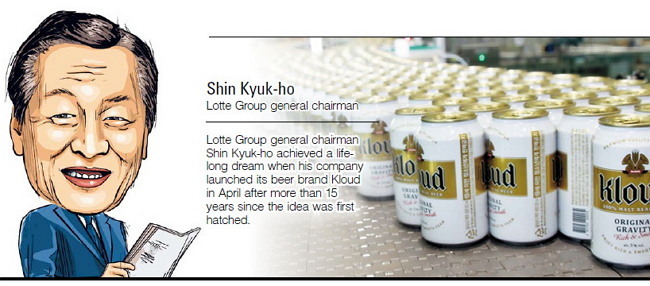No matter how rich you are, there are some things that are beyond your reach.
The Korea Herald Special Investigative Team looked into some of the pet projects on the “bucket lists” of the nation’s top business moguls. Some were realized, some are ongoing, and for a few, the dreams were passed on to the next generation.

Lotte launches beer brand
This April, Lotte Group founder Shin Kyuk-ho, after many years, was able to cross off one item on his bucket list when Lotte launched Kloud, its own brand of beer.
This has been a lifelong dream for the 92-year-old general chairman of South Korea’s fourth-largest business conglomerate. Though Lotte had a knack for producing food and even soju ― Lotte owns the country’s best-selling rice-distilled beverage Cheoeumcheoreom ― beer was never part of its business portfolio.
In 1999, three decades after starting out as a chewing gum maker, Lotte joined a highly competitive bid to take over Jinro-Coors, but was defeated by OB Beer.
In 2009, Lotte attempted to take over OB Beer, but failed again.
Kloud is therefore a dream come true for Lotte. According to the company, 27 million bottles of Kloud have been sold as of July 31. This means that up to three bottles of Kloud are being sold every second, according to Lotte officials.

Hyundai Motor seeks new headquarters
Hyundai Motor Group recently expressed its intent to join the bid for the 80,000-square-meter Korea Electric Power Corp. site in Samseong-dong, southern Seoul.
The move reflects the group chairman Chung Mong-koo’s desire to own a new building to highlight the company’s growing global status, and to bring together all of the group’s major affiliates, including Hyundai Mobis and Glovis, under one roof.
“There is a chronic space shortage at (Hyundai Motor’s) current Yangjae-dong headquarters in southern Seoul, and the chairman has long wished to get a bigger place where all the affiliates could work together,” an industry insider said.
Chung, 76, previously sought to build a 110-floor building on the former Sampyo Remicon headquarters site near the Hangang River bay but his dreams were dashed when the Seoul Metropolitan Government refused to give permission due to height restrictions.
“Hyundai wants a place where it can pursue its legacy, just as its global rivals have done,” said another market watcher. “In this sense, the Samseong-dong site makes perfect sense, as it is the business and traffic center of Seoul.”
Hanjin Group’s dreams for a hotel
For Hanjin Group chairman Cho Yang-ho, it has been a lifelong dream to own a top-tier hotel styled after “hanok,” the traditional Korean home. But this dream seems to be quickly becoming a nightmare.
In August 2013, Cho met with President Park Geun-hye and asked for deregulation on the construction of high-end tourist hotels. His argument was that Hanjin would build a landmark hotel to boost the nation’s image and contribute to local tourism.

Earlier in 2008, Hanjin had purchased a part of the U.S. Embassy site in central Seoul to pursue its plans to construct a facility that would be designed as a hanok, and house a hotel, gallery and concert hall.
However, the plans were barred by regulations banning hotels being built near schools. The site that Hanjin had bought was located next to Deokseong Girls’ Middle School.
Cho invited further criticism when the government attempted to revise the regulation last September to help Hanjin push ahead with its hotel. To make matters worse, experts claimed that bluerpints of the hotel showed that it would not even be built as a true hanok, with only the reception hall designed to echo the hanok style.
“It appears that Hanjin is still a long way off from owning a so-called hanok-styled hotel,” said a person close to the matter.
Maeil’s pursuit of an organic dairy farm
Owning an organic dairy brand was the dream of the late Kim Bok-yong, the founder and former chairman of Maeil Dairies.
Kim’s aspirations were such that he visited his milk farm in Gochang, North Jeolla Province, on the day before his death in 2006, and asked his families and workers to take good care of the company’s future.
It was his wife Kim In-soon, honorary chairman of the group, who succeeded his vision. Maeil in 2008 launched the organic dairy brand Sangha, starting with cheese, gradually adding milk and other products to the lineup.
Maeil also announced a masterplan to turn the Gochang area into an organic dairy center. The company currently operates tours and offers other programs for visitors at the farm to solidify its market position.
Samyang aims to build mountainside leisure complex Samyang Food founder Chun Joong-yoon, who died in July, always said he wanted to build a large leisure complex on the company’s ranch in the mountainous area of Daegwallyeong, Gangwon Province. Making the most of Daegwallyeong’s clean air and environment, what used to be a simple cattle ranch is being turned into a leisure town consisting of ski slopes, accommodation and other leisure facilities, according to a company insider.
Taking into account that nearby Pyeongchang will be hosting the 2018 Winter Olympics, Samyang’s plans are both feasible and profitable, he said, especially considering that Gangwon Province is already a popular holiday spot.
Chung Joong-yoon’s son and Samyang Food chairman Chun In-jang is reportedly in the process of further developing the plans.
By Korea Herald Special Investigative Team
(
baejisook@heraldcorp.com)
Kwon Nam-keun
Hong Seung-wan
Sung Yeon-jin
Bae Ji-sook
Yoon Hyun-jong
Min Sang-seek
Kim Hyun-il










